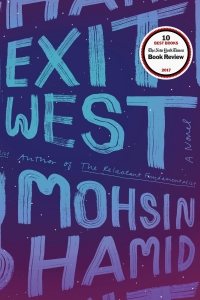
“In a city swollen by refugees but still mostly at peace, or at least not yet openly at war, a young man met a young woman in a classroom and did not speak to her.” With these words, Mohsin Hamid opens his fourth novel. Exit West is a short, elegant book which proves to be a timely commentary on the nature of migration. The main characters, Nadia and Saeed, must leave their war-torn country. The method with which they choose to proceed is through a magical doorway. Such doorways have emerged all over the globe, opening the floodgates of sovereign nations. Through these thresholds of mystical transference, Hamid emphasizes not the act of travel itself, but rather the complexities and fluidity of what it means to be a foreigner or a native, and in doing so troubles the assumed stability of these categories.
Exit West begins in an unnamed, Middle Eastern country where Saeed and Nadia, students at a local university, meet in a class on corporate identity and product branding. Nadia wears a long, black robe that covers her body like a sheath. However, she steadily informs Saeed that she does not pray. Saeed is taken with Nadia at once, and the two begin to develop a friendship. Nadia later tells Saeed that she wears her conservative garments “so men don’t fuck with me.” Nadia is independent and lives alone, a rare choice for unmarried women in her country. Not long before meeting Saeed, she informed her family that she planned to move out. Her abrupt decision caused the family to sever ties with her. In this way, Nadia’s parents and sister are established as elusive entities. Indeed, as the civil war begins to tear at the seams of her country, neither the reader nor Nadia will have closure as to the fate of her family.
Unlike Nadia, Saeed lives with his parents, as is common for unmarried men in his country. His mother was a schoolteacher, and his father continues to be a professor at a nearby university. Saeed’s parents are affectionate and gentle. These qualities are likewise reflected in their son. As the friendship between Nadia and Saeed becomes a courtship, the two confront the rapid decline of their country into a permanent state of warfare. The rebel militias are establishing strongholds in pockets of the city, and the government is finding it increasingly challenging to pacify aggrieved citizens. Gradually, the city becomes a haggard jigsaw puzzle of divided territories.
At first, it is not the centers of such newly established territories that prove dangerous, but rather the checkpoints dividing them. Over time, however, the rebel militants begin to infiltrate the lives of those close to Nadia and Saeed. War is an “intimate experience, combatants pressed close together, front lines defined at the level of the street one took to work, the school one’s sister attended, the house of one’s aunt’s best friend, the shop where one bought cigarettes.” Once, Saeed’s mother thinks she sees a former student of hers firing an automatic rifle from the open bed of a truck. She imagines the man’s shooting stops when he sees her, but she cannot be truly certain it was her student. In another instance, Saeed’s neighbor is targeted for belonging to an ethnic denomination accused of being disloyal to the militants. The neighbor’s throat is cut and blood seeps through the floor above the family’s apartment, a dried, burgundy stain forming on the ceiling. In yet another moment, Saeed brings Nadia supplies for her apartment, apologizing that he could not find flowers. “Do you have a gun?” she responds. Such delicately wrought passages shine a light on the enduring banalities of daily life during wartime.
Eventually, Saeed and Nadia decide they must find a way out of their native country. From the beginning of his book, Hamid has provided glimpses at magical doorways through which thousands of migrants from the Global South are entering wealthy, Western nations: “Rumors had begun to circulate of doors that could take you elsewhere, often to places far away … a normal door, they said, could become a special door, and it could happen without warning, to any door at all.” Nadia and Saeed purchase passage through one of these forbidden escape routes. Traveling through a doorway is described as being born and dying at once. Yet, despite the ambiguity of the doors through which Saeed and Nadia travel—the island of Mykonos they initially land upon, and the uninhabited townhouse they later occupy in London, are unambiguously framed—as both of these locations currently house a plethora of people whose native lands are uninhabitable due to war, or climate, or a combination of the two. Hamid is clear that the reverberations of a global immigrant crisis, sparked in no small part by European and American hegemony, will be felt in the West.
Interspersed throughout Exit West is a series of vignettes that show the reader glimpses of unnamed characters as they interact with those who are flooding, with increasing frequency, into the world’s wealthiest nations. As the story of Nadia and Saeed’s partnership unfolds—a partnership that is born equally of love, obligation, and necessity—the reader is continually reminded of the transformative nature of time in a rapidly globalizing and transitory society. The absurdity of the concept of nativeness is brought forward by Hamid, as he shows how immigrants render countries unhomely and foreign to some of their citizens. Hamid notices how those with “light skin” in America tend to be more outraged by the perceived threat of immigrants, than those who are in actuality native to the land America was established upon. He does this with a thoughtful, extended prose style; often leaving the reader with images invoking a deep, sensory response. Through the utilization of magical realism, Hamid envisions a future that may not be far away.
Hamid’s latest book has been a contender for, and the recipient of, numerous awards. The novel is a favorite of the former president of the United States, Barack Obama. Exit West was named by the New York Times as one of “The 10 Best Books of 2017.”
